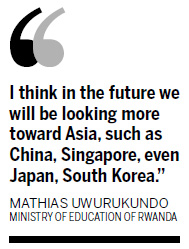China Perspective
Impact goes far beyond roads in E Africa
By Andre Vltchek (China Daily)
Updated: 2010-10-26 09:17
 |
Large Medium Small |
Nairobi, Kenya - The road from Kigali to Ruhengeri in Rwanda is passing through picturesque mountaintops and deep valleys. It is winding along rivers, connecting towns and villages with the national and regional capitals.
| ||||
This is when China rushed to help. In 2009, "China has given Rwanda interest-free loans amounting to $37 million, most of which will fund the Kigali road network rehabilitation project," reported AllAfrica.
Other projects discussed included an agricultural demonstration center and two rural primary schools, the new State House project, a provision of anti-malaria drugs, an anti-malaria center and the dispatch of Chinese volunteers to Rwanda.
|
 |
On top of the road rehabilitation in Kigali and its vicinity, China is involved in extremely complex road construction, which will connect the city of Butare with the main road leading to Gisenyi and the border with theDemocratic Republic of Congo.
"I come from a village near Ruhengeri," said Theogene Rutazibwa, a senior official at the Inspectrate General of Education in Rwanda."Every time I go back home to my village from Kigali, I am truly amazed at how fast I can travel back home with better roads being constructed so rapidly. You know the history of my country. Considering the fact that much was destroyed back in the 1990s, the government has been investing a lot in infrastructure to connect us all Rwandese from one corner of the country to another. However, we lack the resources and above all, skills. That's where I have to say that I am very grateful to Chinese people. They have been doing such a great job and have already shown good results."
China is now deeply involved in East Africa, helping improve the infrastructure but also providing social services and constructing medical centers, schools, cultural and sports facilities and administrative buildings that governments of these impoverished nations often cannot afford. It is even building two new towers, part of Ugandan Parliament in the capital - Kampala.
"I think many of us in Uganda have witnessed major improvements and positive changes thanks to China " said Rosemarie Agoi from Ministry of Education of Uganda. "I hope that China will extend its support to other areas such as those in the social sector, including health and education."
As if sensing urgency of such requests, China is rapidly moving into social and medical fields in this part of the world. One of the most impressive projects is the anti-malaria centers, designed "to help the continent to get rid of the disease", according to the Chinese Ambassador to Kenya Guo Chongli.
According to Roll Back Malaria, there are at least 300 million acute cases of malaria each year globally, resulting in more than a million deaths. Around 90 percent of these deaths occur in Africa, mostly in young children.
While most of the Western medical assistance programs concentrate on HIV and AIDS, the fight against malaria, which kills many more children in sub-Saharan Africa, goes mostly underfunded. Should China succeed in its efforts, lives of millions of men, women and children in Africa could be saved every year.
In Uganda alone, approximately 320 people die from malaria every day (on average, some 70,000 to 110,000 children die from malaria annually). Uganda is one of the first countries where China began its fight against the killer disease with full force. It is building an entire hospital and malaria research center in Naguru, a Kampala suburb. In the meantime, the Chinese government delivered its fourth donation of anti-malaria drugs this year, significantly easing the burden on Uganda, where 40 percent of the country's annual health expenditures go to fight malaria.
That is not all. In Uganda, like in Tanzania, Kenya, Rwanda and other countries in the region, China provides assistance in many diverse fields, including education.
"Countries such as Uganda and Rwanda are highly dependent on external sources to finance education," Yayoi Segi, UNESCO head of education responsible for East Africa, said.
"Traditionally speaking, these countries have received support from European countries and the US. However, in recent years, one of very important developments in the field of education is the fact that other countries are coming on-board. This holds true in the case of China."
"I am sure China will not remain as a founder in infrastructure but will soon move on to supporting knowledge transfer and skills development in the area of technical and vocational education."
Echoing her words, Mathias Uwurukundo from the Ministry of Education of Rwanda said: "We know that our country's infrastructure has been developed very quickly with the support from China.One of the recent, important developments when it comes to their assistance is in the field of education."
Historically, many Rwandans have gone to study in France, the UK and more recently South Africa.
But, Uwurukundo said, "I think in the future we will be looking more toward Asia, such as China, Singapore, even Japan, South Korea."
Andre Vltchek is a novelist, filmmaker and investigative journalist in the US. He travels to Rwanda, Uganda and Kenya where he has seen how Chinese investment and aid help locals.



